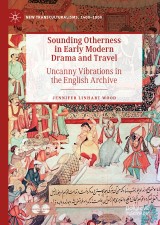Details

Sounding Otherness in Early Modern Drama and Travel
Uncanny Vibrations in the English ArchiveNew Transculturalisms, 1400-1800
|
96,29 € |
|
| Verlag: | Palgrave Macmillan |
| Format: | |
| Veröffentl.: | 23.04.2019 |
| ISBN/EAN: | 9783030122249 |
| Sprache: | englisch |
Dieses eBook enthält ein Wasserzeichen.
Beschreibungen
<div>Winner of the Medieval and Renaissance Drama Society's 2021 Bevington Award for Best New Book<br></div><div><br></div>Sounds are a vital dimension of transcultural encounters in the early modern period. Using the concept of the soundwave as a vibratory, uncanny, and transformative force, Jennifer Linhart Wood examines how sounds of foreign otherness are experienced and interpreted in cross-cultural interactions around the globe. Many of these same sounds are staged in the sonic laboratory of the English theater: rattles were shaken at Whitehall Palace and in Brazil; bells jingled in an English masque and in the New World; the Dallam organ resounded at Topkapı Palace in Istanbul and at King’s College, Cambridge; and the drum thundered across India and throughout London theaters. This book offers a new way to conceptualize intercultural contact by arguing that sounds of otherness enmesh bodies and objects in assemblages formed by sonic events, calibrating foreign otherness with thefamiliar self on the same frequency of vibration.
Introduction: Soundings.- Part I: New World Symphony.- Rattling Soundscapes of Witch Drama and the New World.- Hell's Bells: Delight in Transatlantic Jinglings.- Interlude: Intercultural Remixes. Part II: Songs of the Orient.- An Organ’s Metamorphosis: Thomas Dallam’s Sonic Transformations in the Ottoman Empire.- "Drums Rumble Within": Embodied Experiences of Temples in the East and on the London Stage.- Interlude: A Tale of Two Toms: Dallam and Coryate Speaking in Oriental Tongues.- Part III: World Music: East Is West.- “Something Rich and Strange”: Global Listening and <i>The Tempest</i>.- Coda: "Songs from the Wood."<div><p></p></div>
<b>Jennifer Linhart Wood</b> teaches at St. Mary’s College of Maryland and works for <i>Shakespeare Quarterly</i> at the Folger Shakespeare Library.
Sounds are a vital dimension of transcultural encounters in the early modern period. Using the concept of the soundwave as a vibratory, uncanny, and transformative force, Jennifer Linhart Wood examines how sounds of foreign otherness are experienced and interpreted in cross-cultural interactions around the globe. Many of these same sounds are staged in the sonic laboratory of the English theater: rattles were shaken at Whitehall Palace and in Brazil; bells jingled in an English masque and in the New World; the Dallam organ resounded at Topkapı Palace in Istanbul and at King’s College, Cambridge; and the drum thundered across India and throughout London theaters. This book offers a new way to conceptualize intercultural contact by arguing that sounds of otherness enmesh bodies and objects in assemblages formed by sonic events, calibrating foreign otherness with the familiar self on the same frequency of vibration.
Winner of the Medieval and Renaissance Drama Society’s 2021 Bevington Award for Best New Book Demonstrates the significance of sound in cross-cultural encounters in early modern drama and travel writing Features QR codes in each chapter, giving readers access to sound recordings of the instruments discussed Appeals to students and scholars of Renaissance drama, travel literature, British literature, Shakespeare, sound and sensory studies, historical phenomenology, new materialisms, and music history
“So intent have we been in listening for sounds in particular cultures, in particular places, at particular moments in history that we have missed the cross-cultural resonances. Wood attunes us to those vibrations in <i>Sounding Otherness in Early Modern Drama and Travel</i>. She ingeniously uses five kinds of instruments – rattles, bells, organs, drums, and lutes – to argue for “global listening” that connects Europe with the Ottoman Empire and the Indes East and West as well as the early modern past with the post-modern present.” (Bruce R. Smith, Dean’s Professor of English, University of Southern California, USA)<br><br>“This is a remarkable and highly stimulating exploration of the significance of the sonic within early modern cross-cultural encounters. The attention paid to the bodily experience of sound and its capacity to undermine boundaries of all sorts is extremely thought-provoking. There is fascinating material here on sonic interactions between Europeans and others inmany parts of the world, and the chapter on the organ-maker Thomas Dallam’s adventures in Constantinople is riveting.” (Christopher Marsh, Professor, Queen’s University Belfast, UK)<br><br>“This book beautifully defamiliarizes our experience of sound by calling scholarly attention to sound’s intrinsically transformative and uncanny power. Attending to the soundscapes of the early modern theatre and of the world outside it, Wood documents a series of cross-cultural musical encounters that occur during travels both real and theatrical to far-away lands—travels which turn out, surprisingly, for many of the instruments involved, to be a kind of homecoming. Creative and engaging in its theoretical insights, this book will be a valuable resource for both scholars and students.” (Wes Folkerth, Associate Professor, McGill University, Canada)<br><br>“Wood’s book opens up new territory in the field of global renaissance studies by examining the much neglected soundscapes that accompanied cross-cultural encounters. A must-read for all interested in revisiting how we traditionally understand travel and theater in the early modern period. Thoroughly researched and lucidly written, <i>Sounding Otherness </i>takes us into the fascinating world of maracas and kettledrums that sounded in masques and plays, and to musical travels of Europeans across the globe.” (Amrita Sen, Associate Professor, The Heritage College, University of Calcutta)<br><br>“By opening our ears to the sonic uncanny of the early modern theater, this provocative book gives us new ways to hear, read, and attend to early modern drama. With the author’s unusual sensitivity to sound, and equal gift for teaching her reader, <i>Sounding Otherness</i> shows us how bodies, places, and cultures are intimately connected through the audible reverberations of desire.” (Douglas Bruster, The University of Texas at Austin, USA)<p></p>

















